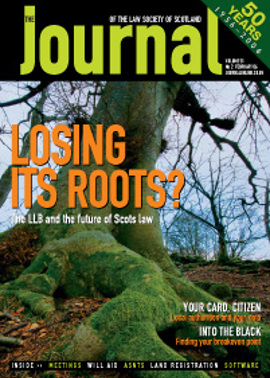Scottish Solicitors' Discipline Tribunal

CALUM WATSON BLYTH
A complaint was made by the Council of the Law Society of Scotland against Calum Watson Blyth, solicitor, formerly of 144 St Vincent Street, Glasgow (“the respondent”). The Tribunal found the respondent guilty of professional misconduct in respect of his misappropriation of client funds for personal gain and his breach of rules 6 and 12 of the Solicitors (Scotland) Accounts Rules 1992 and subsequent versions thereof. The Tribunal ordered that the name of the respondent, Calum Watson Blyth, be struck off the Roll of Solicitors in Scotland.
The respondent did not lodge answers and did not attend the Tribunal hearing. The Society led affidavit evidence of three witnesses. The Tribunal was satisfied that the facts alleged in the complaint were proved beyond reasonable doubt and that the respondent’s actings amounted singularly and in cumulo to professional misconduct. The respondent did not provide the Tribunal with any explanation for his actions. The public expects and is entitled to expect solicitors to be persons of integrity. A solicitor who falls short of qualities of honesty, truthfulness and integrity brings the profession into disrepute. In this case the respondent misappropriated clients’ funds to the extent of £223,787.99. The Tribunal found this conduct regrettably disgraceful and dishonourable and held that there was no place in the profession for a solicitor who acts in this way.
Publicity was deferred until the conclusion of criminal proceedings.
PHILIP GEORGE DAWSON
A complaint was made by the Council of the Law Society of Scotland against Philip George Dawson, solicitor, 1 East Craibstone Street, Aberdeen (“the respondent”). The Tribunal found the respondent guilty of professional misconduct in respect of his failure to ascertain from clients that he had their instructions to prepare revocations of welfare powers of attorney and his failure to explain to his clients the nature of the revocations which he had prepared for them and the consequential effect thereof. The Tribunal censured the respondent.
The facts in the complaint were admitted and the Tribunal heard submissions on whether or not the facts amounted to professional misconduct. The Tribunal considered that the respondent’s immediate action in complying with the request of a client (the signatories’ son) and thereby disregarding all warning signs had not been adequately explained. In terms of the Sharp test, taking into account the whole circumstances of the case, the respondent proceeded to comply with the request in the face of all the indicators in an email that what he was undertaking was contrary to the professional obligation of a solicitor to know his client and have instructions from his client, or if not at least to take reasonable steps to confirm instructions said to have come from the client. The Tribunal regarded the parents as vulnerable as they were elderly people caught up in a dispute between their children. The Tribunal considered that the respondent had a duty to seek clear and unambiguous instructions from the parents and had had ample opportunity to do so. The Tribunal was of the view that the revocations were not self-explanatory documents and that an explanation of the effect of the documents was an essential part of the signing process. The Tribunal was also of the view that the revocations were not neutral documents and that the consequences of their execution were potentially far more material than that of tendering a not guilty plea, as suggested by the respondent’s solicitor. The Tribunal found the respondent guilty of professional misconduct. The Tribunal however considered that the misconduct was at the lower end of the scale and took account of the respondent’s previous unblemished record and the references received on his behalf.
APPEAL UNDER SECTION 42A: MESSRS MACROBERTS & RICHARD BARRIE
An appeal under section 42A was made by Messrs MacRoberts, solicitors and Richard Barrie, solicitor, 152 Bath Street, Glasgow (“the appellants”) against a determination and direction made by the Council of the Law Society of Scotland. The Tribunal quashed the determination and direction made by the Society.
The determination made by the Society was that the appellants had provided an inadequate professional service in respect of two separate heads of complaint. One head of complaint was that the appellants had failed or delayed to advise their client in writing of the fees and outlays to be charged or the basis upon which the fees and outlays were to be charged. The other head of complaint related to the appellants withdrawing from acting for their client at a time which prejudiced their client’s court action. The Tribunal found that there had been an effective indication of costs given to the client verbally, and given the fact that the client had retained the information and produced it in correspondence two years later, the Tribunal was of the view that this was effective communication. As it was not in writing, the Tribunal considered that it was not good practice but it was not sufficient to cause the standard of service to fall short of the quality that could reasonably be expected of a competent solicitor. In relation to the other head of complaint, the Tribunal took the view that the word “prejudice” implies the concept of unreasonable prejudice, as any withdrawal from acting in the course of litigation will cause some prejudice. The Tribunal considered that as the client was an active businessman he either knew or should have known that non-payment of his solicitor’s invoices was bound sooner or later seriously to prejudice the business relationship. The Tribunal however considered that there was a professional responsibility on the appellants to give reasonable and clear notice that continued non-payment would lead to the withdrawal of agency. The Tribunal did not consider that five weeks was an unreasonably short period in which to instruct other agents. The Tribunal accordingly found that the point in time when withdrawal was intimated did not unreasonably prejudice the client’s court action.
Visit the Tribunal’s website at www.ssdt.org.uk
In this issue
- Legal aid in children's hearing referrals
- Still waters run deep
- Catch-up or patch-up?
- Legal science or law-lite?
- Heads above water
- Your name on file
- A welcome addition
- Another ***** meeting?
- A neglected asset
- Planning a year of action
- The Pagan mission
- A good case to read
- Jurisdiction: dispelling the myth
- That special something
- The art of cashing in
- Scottish Solicitors' Discipline Tribunal
- Website reviews
- Book reviews
- In on the Act
- Keeper's corner






